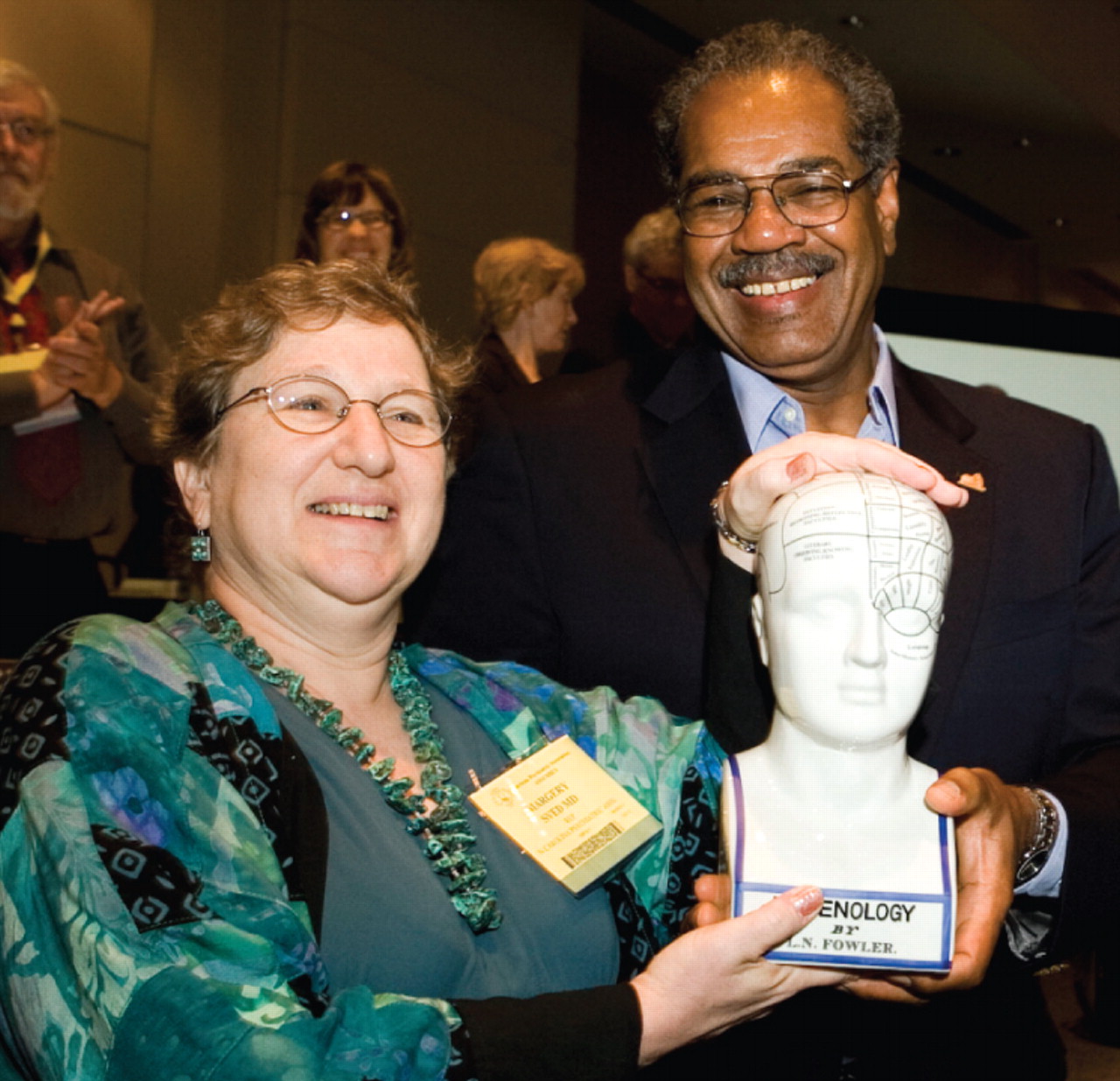Recent Meeting Found Assembly Looking Inward, Outward
The APA Assembly at its meeting last month in San Francisco passed several action papers involving psychiatry education and training. Prominent among them was a resolution endorsing development of an APA position statement on the “responsibilities of training programs to psychiatric residents and fellows,” originally titled a “bill of rights.”

Assembly Speaker Ron Burd, M.D. (left), and Speaker-elect Gary Weinstein, M.D., discuss a point of parliamentary procedure at last month's Assembly meeting.
Credit: David Hathcox
The Assembly acknowledged that residents and fellows are both students and employees, thus giving them a unique but sometimes murky status in their institution's personnel structure. The proposal noted that “training programs are under increased pressure to meet contractual obligations [that] may compromise the quality of the education and training residents and fellows receive,” thus potentially leaving them in need of certain protections to ensure that they are treated fairly and that their training is not compromised.
While Assembly members recognized that the AMA and the Accreditation Council for Graduate Medical Education (ACGME) have issued policies to protect residents, they agreed that APA should go on record with a strong statement of its commitment to “illuminating [residents'] rights and advocating for provisions it believes all residents should be afforded and that have not yet been designated as rights.” The Assembly also urged APA to post the AMA and ACGME guidelines on the APA Web site.
Assembly representatives also voted to have APA develop “policies addressing violence toward residents in training programs,” which would then be disseminated to all such programs. In addition, they called on APA to encourage its district branches “to develop and maintain a directory of mentors both organizational and professional” that would be available to the district branch's members-in-training.
In another area related to training, the Assembly called on APA to develop an education program on telepsychiatry and make it available to APA members on its Web site. The proposal noted the severe access-to-care problems facing patients in rural areas and that telepsychiatry is one strategy that could ameliorate those problems, but more psychiatrists need to be trained in its use.”

Assembly members try out a new voting tool to make vote counting easier—holding up red cards to signify a “no” vote or green cards for a “yes” vote.
Credit: David Hathcox
One topic that was prominent on the Assembly's agenda was the relationship of APA and of individual psychiatrists with the pharmaceutical industry. The representatives passed an action paper, for example, that suggests that APA, the media, and the public have been demonizing the pharmaceutical industry's marketing activities, and that a major reduction in collaborative activities with the industry could lead to “a shift of [the industry's] support to the field of psychology and clinical psychologists with prescribing privileges in particular.” As a result, the proposal urges APA leaders to“ continue to meet with appropriate representatives of the pharmaceutical industry to collaborate” in ways that acknowledge the “legitimate interests of each party and the essential contribution each makes to patient care.
A work group appointed by outgoing President Nada Stotland, M.D., has also been assessing what the boundaries should be in the relationship between the pharmaceutical and medical-device industries and individual psychiatrists. After the Board discussed the group's report at its March meeting, it was forwarded to the Assembly for review and discussion, and its chair, former APA President Paul Appelbaum, M.D., was at the Assembly meeting to answer questions.
The group's recommendations cover often controversial areas such as acceptance of gifts and medication samples, attendance at industry-sponsored educational programs, presentations made at such programs, consultation arrangements, contact with representatives of pharmaceutical and medical-device companies, and various aspects of conducting research in which these firms are involved.
Assembly members were divided on the report's recommendations, with supporters urging that it is time for psychiatrists to rein in their interactions with industry, while others objected to APA's issuing recommendations on how they should behave professionally on these matters, even though the recommendations would not be standards of practice or part of an ethics code. The Assembly's comments were sent back to the Board.
The Assembly was also faced with a packet of 14 action papers concerning APA's governance structure, almost all of them focused on“ remodeling” the Assembly to improve its functioning and reduce its cost. They were to be forwarded for review to an ad hoc committee to be appointed by the speaker, with a report due in November at the Assembly's next meeting. Among these proposals were ones to
consolidate the Board and Assembly into one governing body, | |||||
combine Areas 1 and 2 and Areas 6 and 7, | |||||
eliminate multiple district branches in the three states that have them—New York, California, and Missouri, | |||||
limit each district branch to one representative and one deputy representative instead of using a system in which the number of APA members in a district branch determines the number of Assembly representatives; deputy representatives would attend Assembly meetings only when the representative could not do so. Currently all deputy representatives can attend, and | |||||
require Assembly members other than members-in-training and early career psychiatrists to pay for their own hotel, food, and incidental expenses associated with attending Assembly meetings. | |||||
The Assembly also acted on several other matters, including votes to have APA
develop a position statement opposing sentences of life in prison without the possibility of parole for crimes committed by juveniles, | |||||
collaborate with the American Academy of Child and Adolescent Psychiatry in developing a position statement regarding children and guns in light of the thousands of injuries and deaths each year attributed to children's use of firearms, | |||||
work toward repeal of the federal code that prohibits facilities in the Department of Veterans Affairs from going smoke free, | |||||
work with its AMA delegation and district branches “to endorse a position statement articulating the principle that physicians should be compensated by insurance, managed care, and pharmacy benefits management companies for the time they are required to devote to utilization review, benefits administration, consulting to those companies, and other related activities.” | |||||
call on the Council on Research and Quality Care to develop an APA position statement on the use of brain-imaging technologies in clinical and forensic psychiatry, in light of the increasing use of brain imaging and courses on its uses being offered to a range of mental health professionals. | |||||

John Gaston, M.D., presents Margery Sved, M.D., of North Carolina with the 2009 Ronald Shellow, M.D., Award, which is given to a departing member of the APA Assembly for extraordinary service. Sved has been in the Assembly since 1995 and has served on many of its committees.
Credit: David Hathcox
Assembly members also heard a talk, actually a pep talk, from attorney Joe Dunn, CEO of the California Medical Association, on how psychiatrists can be effective advocates for their causes in the legislative arena. It is in politics, law, and economics that the most serious challenges facing medicine now reside, he noted. In these areas the “linear thinking” that made future physicians “the smartest kids in their class beginning in elementary school” doesn't bring the desired results, said Dunn, a former member of the California legislature.
In politics, he said, only 10 percent of the decision-making process is based on an issue's merits. The real determining factors are relationships that politicians have built with their colleagues and voting constituents.
He offered suggestions on how psychiatrists could build a relationship with an elected representative. Begin by finding out his or her birthday, he said, and then send a birthday card. The legislator needs “to know who you are,” and staff members will definitely pass on the greeting. Two months later phone the office and say you just wanted to wish the legislator a good day. “It sounds silly,” but staff members will remind the legislator about the earlier birthday card. Then invite the legislator to a holiday party, but don't worry about him or her actually showing up—that won't happen, but the legislator will get the message that you're watching. Then, when psychiatry is facing a bill hostile to its interests, you will have a relationship that makes it likely you can get a face-to-face meeting with your representative, who will be thinking “you can affect my future political races.” ▪



